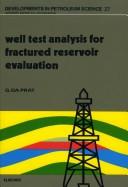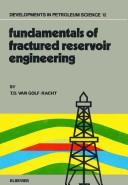| Listing 1 - 10 of 60 | << page >> |
Sort by
|
Book
ISBN: 9780444563552 0444563555 9780444563354 0444563350 1283396319 9786613396310 Year: 2012 Publisher: Amsterdam ; Boston : Elsevier,
Abstract | Keywords | Export | Availability | Bookmark
 Loading...
Loading...Choose an application
- Reference Manager
- EndNote
- RefWorks (Direct export to RefWorks)
Multi
ISBN: 9780128136508 0128136502 0128136499 9780128136492 Year: 2019 Publisher: Cambridge, MA Elsevier Ltd. :Gulf Professional Publishing
Abstract | Keywords | Export | Availability | Bookmark
 Loading...
Loading...Choose an application
- Reference Manager
- EndNote
- RefWorks (Direct export to RefWorks)
Reservoir Engineering Handbook, Fifth Edition, equips engineers and students with the knowledge they require to continue maximizing reservoir assets, especially as more reservoirs become complex, more multilayered, and unconventional in their extraction method. Building on the solid reputation of the previous edition, this new volume presents critical concepts, such as fluid flow, rock properties, water and gas coning, and relative permeability in a straightforward manner. Water influx calculations, lab tests of reservoir fluids, oil and gas performance calculations, and other essential tools of the trade are also introduced, reflecting on today's operations. New for this edition is an entire new chapter devoted to enhanced oil recovery techniques, including WAG. Critical new advances in areas such as well performance, waterflooding and an analysis of decline and type curves are also addressed, along with more information on the growing extraction from unconventional reservoirs. Practical and critical for new practicing reservoir engineers and petroleum engineering students, this book remains the authoritative handbook on modern reservoir engineering and its theory and practice.
Book
ISBN: 1554417767 Year: 2006 Publisher: Chicoutimi : J.-M. Tremblay,
Abstract | Keywords | Export | Availability | Bookmark
 Loading...
Loading...Choose an application
- Reference Manager
- EndNote
- RefWorks (Direct export to RefWorks)
Book
ISBN: 0323901166 9780323901178 0323901174 9780323901161 Year: 2021 Publisher: Cambridge, MA
Abstract | Keywords | Export | Availability | Bookmark
 Loading...
Loading...Choose an application
- Reference Manager
- EndNote
- RefWorks (Direct export to RefWorks)
Book
ISBN: 9780128202708 012820270X 9780128202692 Year: 2023 Publisher: Cambridge, MA
Abstract | Keywords | Export | Availability | Bookmark
 Loading...
Loading...Choose an application
- Reference Manager
- EndNote
- RefWorks (Direct export to RefWorks)
Tight Oil Reservoirs: Characterization, Modeling, and Field Development, the latest release in the Unconventional Reservoir Engineering Series, delivers a full spectrum of reservoir engineering guidelines so that the engineer can focus on every stage of development specific to tight oil. Covering characterization, micro- and nano-scale modeling, drilling horizontally, completing hydraulic fracturing, and field development, each section includes case studies, practice exercises, and future references for even deeper understanding. Rounding out with coverage on field economics and remaining challenges, this book puts control in the engineer’s hands.
Book
ISBN: 9781856178549 1856178544 9781856178532 1856178536 Year: 2013 Publisher: Oxford Waltham, Mass. Gulf Professional Publishing
Abstract | Keywords | Export | Availability | Bookmark
 Loading...
Loading...Choose an application
- Reference Manager
- EndNote
- RefWorks (Direct export to RefWorks)
Finding a new oil and gas discovery and evaluating its volume is a difficult and challenging task, and yet there is very little published on the topic. Luiz Amado delivers a one-of-a-kind introductory guide titled Reservoir Exploration and Appraisal. Providing logistical instruction and processes for the entire exploration and appraisal process, Amado furnishes the guidance, workflow, and practical recommendations needed based on real-world scenarios. Written by an engineer with over 15 years of experience in the North Sea, Gulf of Mexico, South America and West Africa, Reservoir
Oil reservoir engineering. --- Petroleum engineering --- Gas reservoirs.
Multi
ISBN: 9780128034460 0128034467 0128034378 9780128034378 Year: 2016 Publisher: [Place of publication not identified] GULF PROFESSIONAL
Abstract | Keywords | Export | Availability | Bookmark
 Loading...
Loading...Choose an application
- Reference Manager
- EndNote
- RefWorks (Direct export to RefWorks)
Fluid Phase Behavior for Conventional and Unconventional Oil and Gas Reservoirs delivers information on the role of PVT (pressure-volume-temperature) tests/data in various aspects, in particular reserve estimation, reservoir modeling, flow assurance, and enhanced oil recovery for both conventional and unconventional reservoirs. This must-have reference also prepares engineers on the importance of PVT tests, how to evaluate the data, develop an effective management plan for flow assurance, and gain perspective of flow characterization, with a particular focus on shale oil, shale gas, gas hydrates, and tight oil making. This book is a critical resource for today’s reservoir engineer, helping them effectively manage and maximize a company’s oil and gas reservoir assets. Provides tactics on reservoir phase behavior and dynamics with new information on shale oil and gas hydrates Helps readers Improve on the effect of salt concentration and application to C02-Acid Gas Disposal with content on water-hydrocarbon systems Provides practical experience with PVT and tuning of EOS with additional online excel spreadsheet examples
Oil reservoir engineering. --- Petroleum reserves --- Mathematical models.

ISBN: 9780444886910 0444886915 9780080868851 0080868851 1281789283 9781281789280 9786611789282 Year: 1990 Publisher: New York Elsevier
Abstract | Keywords | Export | Availability | Bookmark
 Loading...
Loading...Choose an application
- Reference Manager
- EndNote
- RefWorks (Direct export to RefWorks)
The main purpose of this book is to provide the reader with a basic understanding of the behaviour of fractured reservoirs, using evaluation techniques based on processing pressure and flow-rate data resulting from production testing.It covers the fundamental reservoir engineering principles involved in the analysis of fluid flow through fractured reservoirs, the application of existing models to field cases, and the evaluation and description of reservoirs, based on processed data from pressure and production tests. The author also discusses production decline analysis, the understand

ISBN: 9780080868660 0080868665 9780444420466 0444420460 1281756105 9781281756107 9786611756109 6611756108 Year: 1982 Publisher: New York Elsevier
Abstract | Keywords | Export | Availability | Bookmark
 Loading...
Loading...Choose an application
- Reference Manager
- EndNote
- RefWorks (Direct export to RefWorks)
Fundamentals of Fractured Reservoir Engineering.
Fracture mechanics. --- Oil reservoir engineering. --- Rock mechanics.
Multi
ISBN: 9780444899996 0444899995 9780080868967 0080868967 1282167855 9781282167858 9786612167850 6612167858 Year: 1994 Publisher: New York Elsevier
Abstract | Keywords | Export | Availability | Bookmark
 Loading...
Loading...Choose an application
- Reference Manager
- EndNote
- RefWorks (Direct export to RefWorks)
When Fertl's first book, Abnormal Formation Pressures, was published by Elsevier in 1976, the topic was relatively new in book form. In the years that followed, his book became the standard work for petroleum engineers and drillers. The list of major petroleum provinces with abnormally high pore pressures has grown steadily over the years, and with it has grown our knowledge and experience. There have also been technological advances. A new book was required, but no longer could the topic be covered adequately by one person. The problems of abnormally high formation pressures encount
| Listing 1 - 10 of 60 | << page >> |
Sort by
|

 Search
Search Feedback
Feedback About UniCat
About UniCat  Help
Help News
News